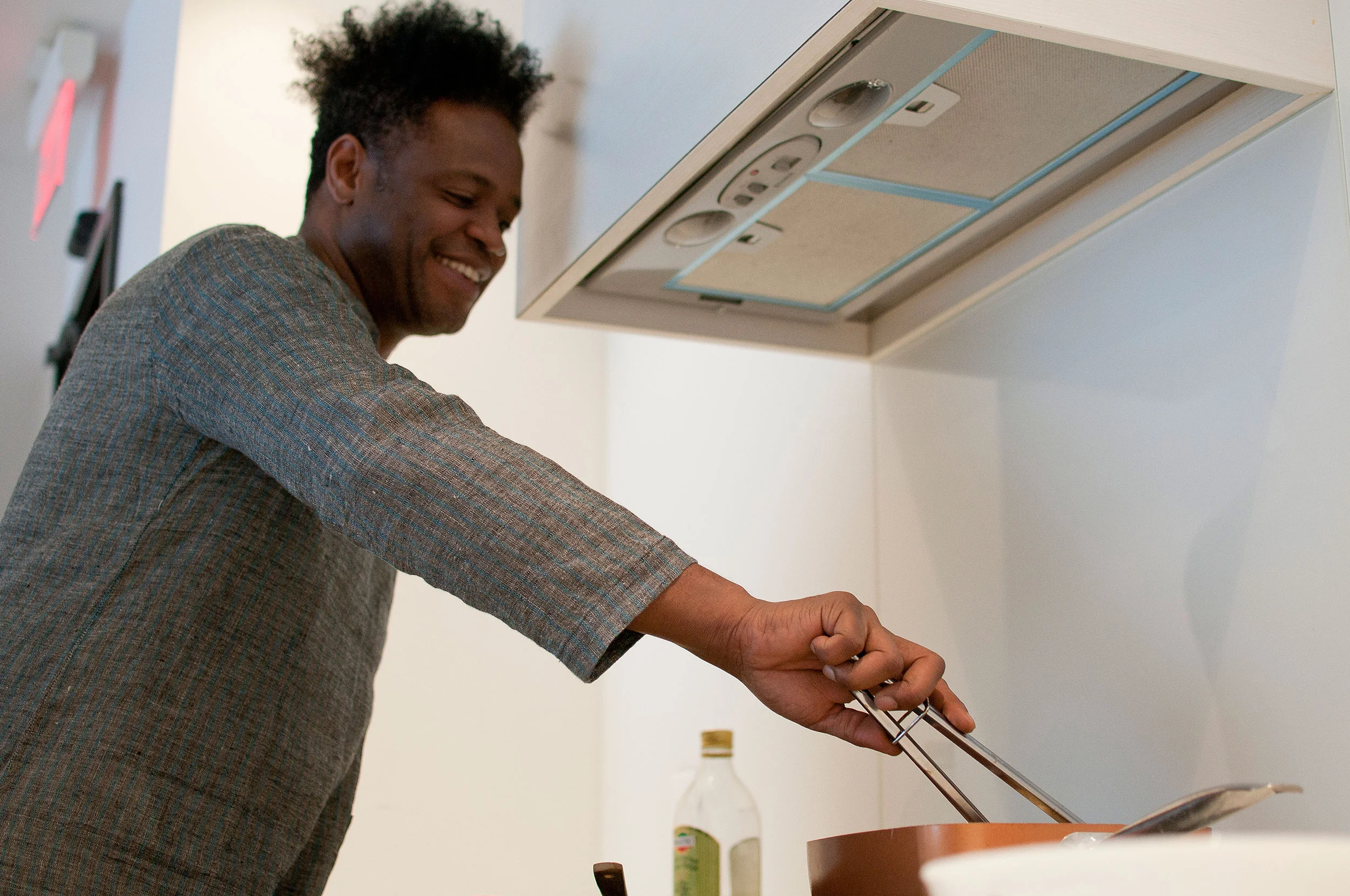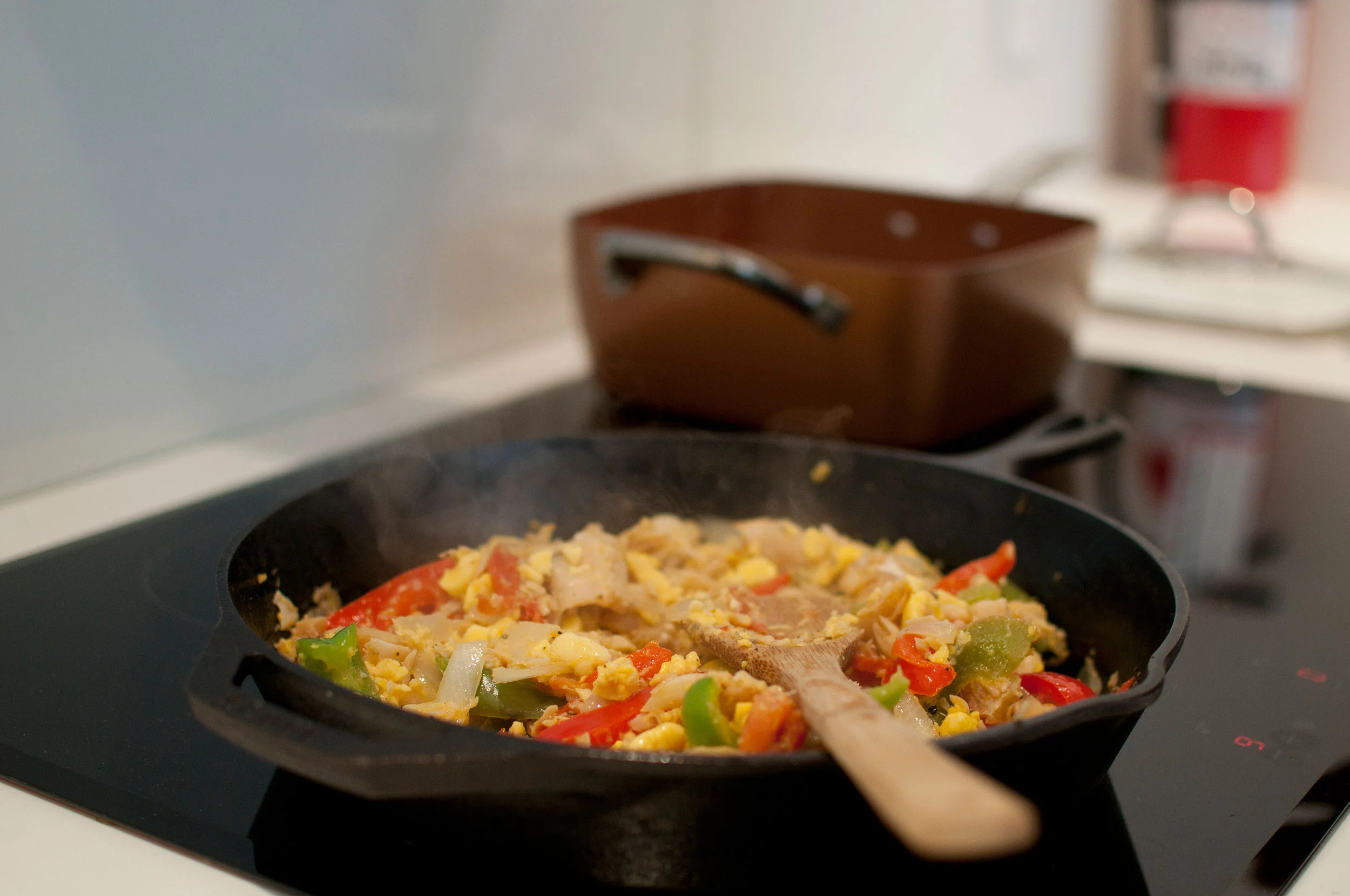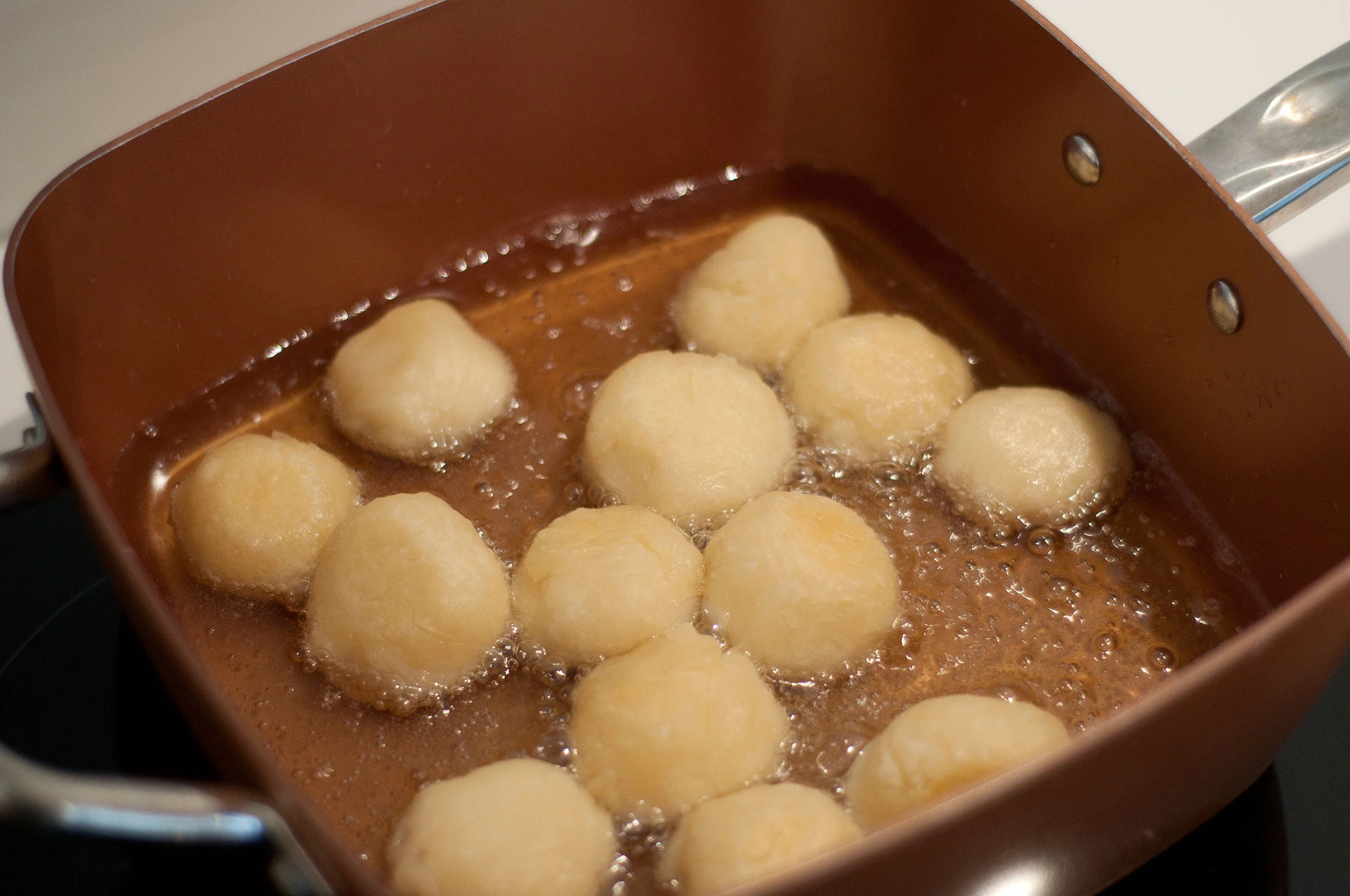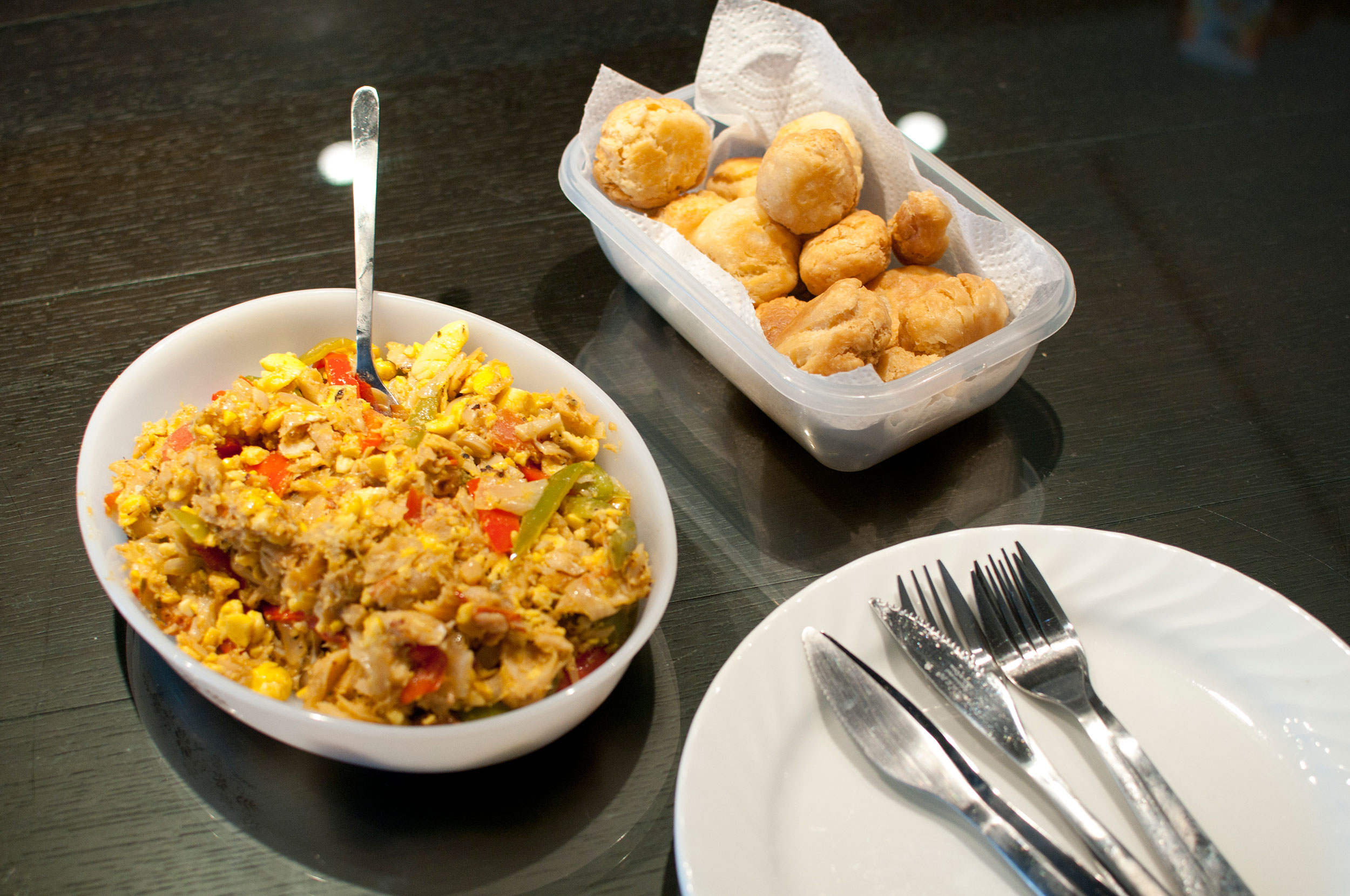IN CHARLES'S KITCHEN
FROM APRIL 2019 ISSUE OF WEST END PHOENIX
Today’s special: ackee and salt fish
Filmmaker Charles Officer learned how to cook from his parents, and how to fight from his three older sisters. While soaking fish and frying johnnycakes, he opens up about using his might, and his work, to help one of those sisters, who’s battling for her life
Charles Officer lives in a condo on the east side of town, but we can’t cook in his kitchen today. It’s a construction zone, like much of Regent Park during the ongoing revitalization project that seems never-ending. So he meets me in the lobby of his building, whisks me past the front desk and leads me to the only room available.
It is the most soulless of spaces, a conference room in a condo that looks like it was designed by robots who themselves were designed by a retired real-estate agent. But there is a stove here, and that at least gives me hope. And there is Charles, with kind eyes and a quick smile. He unpacks a bag he’s brought with him and lays out his mise en place.
Charles gets right to work. He pulls out a number of containers, one filled with ackee the colour of cooked egg yolk, another with sliced onions, peppers and tomato, and one with salt cod. “First I soak the fish for an hour in water,” he tells me. “Then I boil it for 45 minutes and strain it. I let it cool a bit and then I chunk it. I like it in bigger pieces.”
The son of Ionie Agatha Officer and Herbert Constantine Officer, and younger brother to Jeanette, Hannah and Christine, he grew up across the street from East General, where Ionie worked as a nurse. His dad was an electrician who came over from England and fought to get into the union here. “I remember them calling him ‘black bastard.’ He didn’t have an easy time.”
His parents both cooked, and between the two of them Charles became adept in the kitchen. “My father loved making Sunday roasts, because it’s a British thing to do. Beef roast, lamb, chicken – every Sunday we had these juicy cook ups. It was the most peaceful time.” These days, when the holidays come, it’s Charles who cooks all the big family meals.
The pan is hot and he begins to sauté the soaked and boiled saltfish. He adds the ackee, this from a can, and well rinsed. The grey suit of a room begins to warm with cooking smells.
Before Charles was a filmmaker he was a semi-pro hockey player, and a graphic designer and, briefly, a model. His parents taught him how to cook but his sisters taught him how to fight and how to play hockey. “Growing up I was like the fourth sister. They’re quite older than me – they used to dress me up.”
Jeanette is the oldest. “She has a black belt in jiu-jitsu, collects samurai swords and played for the first women’s hockey league in the GTA.” He compares middle sister Hannah to Sade. “She was beautiful, a model and an amazing artist.” Christine was an artist too, and a basketball player: “I think she still holds records in the GTA for basketball,” he says.
“Jeanette was like a big brother. She used to beat up boys all the time. No one touched me. They were like, ‘You’re Jeanette Officer’s brother? Man.’”
Charles heats another pot and begins rolling balls of dough between his hands.
He’s spent his entire life in the East End, except for a stint in Germany during his hockey career. East York is home. In deference to this strange room we are in, I ask about the changes being made to Regent Park.“I’m not averse to the idea of revitalization,” Charles says. “I have problems with the approach. The reason this area needs to be revitalized is because of neglect. The councillors, developers, the TCHC get away with murder, the way they treat people.”
His 2017 documentary film, Unarmed Verses, about the residents of Villaways, a Toronto Community Housing project that underwent a similar revitalization process, speaks to the issue. It won best Canadian feature at Hot Docs and was included in TIFF’s top films of the year.
As he begins to fry the johnnycakes, a dumpling recipe he learned from his dad, he tells me how he got his start in the industry, designing the poster for Atom Egoyan’s opera Salome at the COC. He saw the production. “It was opera but it was cinematic,” he says.
Then he met Jacqueline McClintock and soon found himself taking her acting class. His fellow students included Sarah Polley and Scott Speedman. McClintock saw something in Charles and sent him to New York. He took a leave from his design job and attended the Neighborhood Playhouse School of the Theatre, and while he was there to act, he found himself writing. He spent a year at the school, then came back to Canada ready to make a movie. He had no money and no experience but he made the film – When Morning Comes – and it got into TIFF.
When the johnnycakes are done, we convene at the conference table for a feast of ackee and saltfish, tall glasses of mango juice and the expertly fried dumplings. This is his heart and his boyhood and his whole family, right here on the plate.
That’s when Charles tells me about his sister Hannah.
Hannah had always had sickle cell anemia; it’s a hereditary disease. The family lived with her illness all their lives, but because Mom was a nurse it was managed and didn’t make much of an impact. So little, in fact, that Charles didn’t even really understand the disease until his 20s. That’s when Hannah went into crisis; this is what it is called when sickle cell manifests itself in a person, when it lashes out and consumes a body with unbearable pain. Hannah was hospitalized and Charles began to do his homework. It’s a disease that gets worse and more aggressive with age. Hannah was in the hospital and her family was frightened, and then her doctor told her to get ready to die.
“She was 22. She was told she wouldn’t live past 30,” Charles says. “It changed her life.” He shakes his head. “No, it destroyed her life, actually, because my sister is alive but she’s still waiting to die.” Hannah is now in her 50s.
“When you look at who this disease affects,” Charles says, “it’s not the most popular people on the planet, right? Sub-Saharan Africans, people from the Caribbean – it doesn’t affect Caucasians.” Again he shakes his head.
Under the spectre of a death sentence, Hannah fought back and decided she wanted to have a baby. Charles was in the hospital with her when she gave birth to Darian. “She lost so much blood she could barely speak. She couldn’t even hold her baby.” Charles took Darian home with him while Hannah stayed in the hospital. “I remember sleeping with this little baby in my bed, terrified of rolling over.”
For five days he cared for his new nephew. “All the fears that were coming up in me were intense. That’s when Nurse. Fighter. Boy came to me. I had to talk about sickle cell anemia and I had to talk about the idea of leaving a child behind.” It took a few years, but he wrote and shot the movie in 28 days on a handheld camera in and around his neighbourhood.
“Hannah showed up at a screening I did last year,” Charles tells us. “I didn’t know she was going to come, and I didn’t recognize her. The illness is taking its toll.”
Snow swirls outside the windows. Someone starts playing a piano down the hall.
“There needs to be some awareness around it. There’s so little support, and she doesn’t have the kind of care that she needs.” The frustration in his voice is clear, and the fear. “Darian is her sidekick, and she’s supposed to be preparing him for the world. All they’ve got is each other and I’m terrified for what’s next.”
Hannah is still fighting, despite the pain she is in. “The pain doesn’t stop. That’s what she’s battling with on a daily basis,” he says. “The medication masks the pain. It doesn’t get rid of it.”
We sit among the remains of the feast. Not much is left, and the sun illuminates the last specks and crumbs.
“Overcoming is one thing, but sometimes that just doesn’t happen. I haven’t overcome this, my sister hasn’t overcome this, my family hasn’t. But it doesn’t make it impossible to navigate life while traumatic things are happening. We’re still in this, and it’s just as important being able to manage through things that can’t be overcome.”
Ackee and saltfish
makes 2-3 servings
ingredients
1⁄2 lb salted codfish (boneless)
1⁄2 cup olive oil
1 onion, sliced thin
4 garlic cloves, minced
1 can ackee, drained and rinsed
1 tsp ground black pepper
1 tsp paprika
1 tsp (or more to taste) Signature Blends Salad Herbs (the secret ingredient)
3 sprigs of fresh thyme
1 tomato, chopped
1 each red and green bell pepper, cut into strips
1⁄4 Scotch bonnet, finely chopped
method
Soak the saltfish in cold water for 1 hour, rinse and put in boiling water for 45 min. Strain and let cool. Break into chunks and set aside.
Heat oil in a frying pan, add onion and garlic, and sauté briefly to soften. Add the ackee and saltfish, sprinkle with black pepper, paprika and the secret ingredient and mix well. After a few minutes add the rest of the ingredients and cook, stirring occasionally, until cooked through – 8 to 10 minutes or so. Serve hot.





